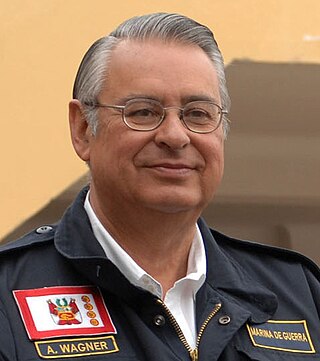Top Qs
Timeline
Chat
Perspective
Allan Wagner Tizón
Peruvian diplomat and politician From Wikipedia, the free encyclopedia
Remove ads
Allan Wagner or Edward Allan Wagner-Tizón (born February 7, 1942) is a Peruvian diplomat who has served three times as his country's Minister of Foreign Affairs from 1985 to 1990, 2002 to 2003, and also in 2021. He also served as Peru's Minister of Defense from 2006 to 2007.
In 2008, he was Peru's representative before the International Court of Justice in the case concerning delimitation of its maritime borders with Chile.[1]
Remove ads
Early life and education
Wagner-Tizon was born in 1942, the son of Carlos Adolfo Wagner-Vizcarra and María Antonieta Tizón-Ponce.
He completed his primary studies at the Marist School of San Isidro (Colegio Maristas de San Isidro) and high school at the Great Ignacio Merino de Talara School Unit. He then studied chemical engineering at the National University of Engineering, as well as at the National University of Trujillo from 1959 to 1962. He also studied humanities at the Pontifical Catholic University of Peru from 1963 to 1964.
Remove ads
Career
Summarize
Perspective
Wagner began his career at the Ministry of Foreign Affairs on May 2, 1963 where he earned a position of Assistant (5th class) following competitive public exams.
He later oversaw Peru’s participation in the General Agreement on Customs Tariffs and Trade, traveling to Switzerland to train in international trade negotiations.
He became Minister of Foreign Affairs in 1985 in the Alan Garcia government, serving until 1990.[2] In February 1986, Wagner and the economic minister, Luis Alva Castro, met with the IMF in Washington, DC to discuss the latter's threats to declare Peru ineligible for further borrowings unless it paid $75 million in overdue payments.[3] The same week, he was one of eight Latin American foreign ministers who met with US Secretary of State, George Shultz, to ask the United States to stop supporting Nicaraguan rebels and to engage in talks with the governing Sandanistas.[4]
In 1992, Wagner Tizon was Peruvian Ambassador to Venezuela. He resigned in protest when the Peruvian legislature was dissolved, the constitution was suspended, and the president, Alberto Fujimori, called a state of emergency.[5]
In 1995, Wagner was serving as director of development of organisation Sistema Económico Latinoamericano (SELA) concerned with the implications of the TRIP agreement for Latin America.[6]
In 1998, as foreign minister, Wagner signed a petition asking the UN to work towards liberalisation of drug laws.[7]
Wagner was sworn in again as foreign minister in 2002 by President Alejandro Toledo,[2] a role he held until 2003.
Wagner participated in various meetings that led to the signing of the Cartagena Agreement and the creation of the Andean Group (today's Andean Community of Nations). He served as secretary-general of the community from 2004 to 2006.
Wagner also served as Minister of Defense of Peru from 2006 to 2007. In 2007, he hosted US Defence Secretary Robert Gates and tried to downplay concerns that the US was looking for a home for an air force base in Peru in the face of widespread public disapproval.[8]
In 2008, he was Peru's representative before the International Court of Justice in a case concerning delimitation of its maritime borders with Chile.[1]
In 2018, he was appointed to head up a commission to provide recommendations for judicial reform.[9]
Remove ads
References
External links
See also
Wikiwand - on
Seamless Wikipedia browsing. On steroids.
Remove ads

